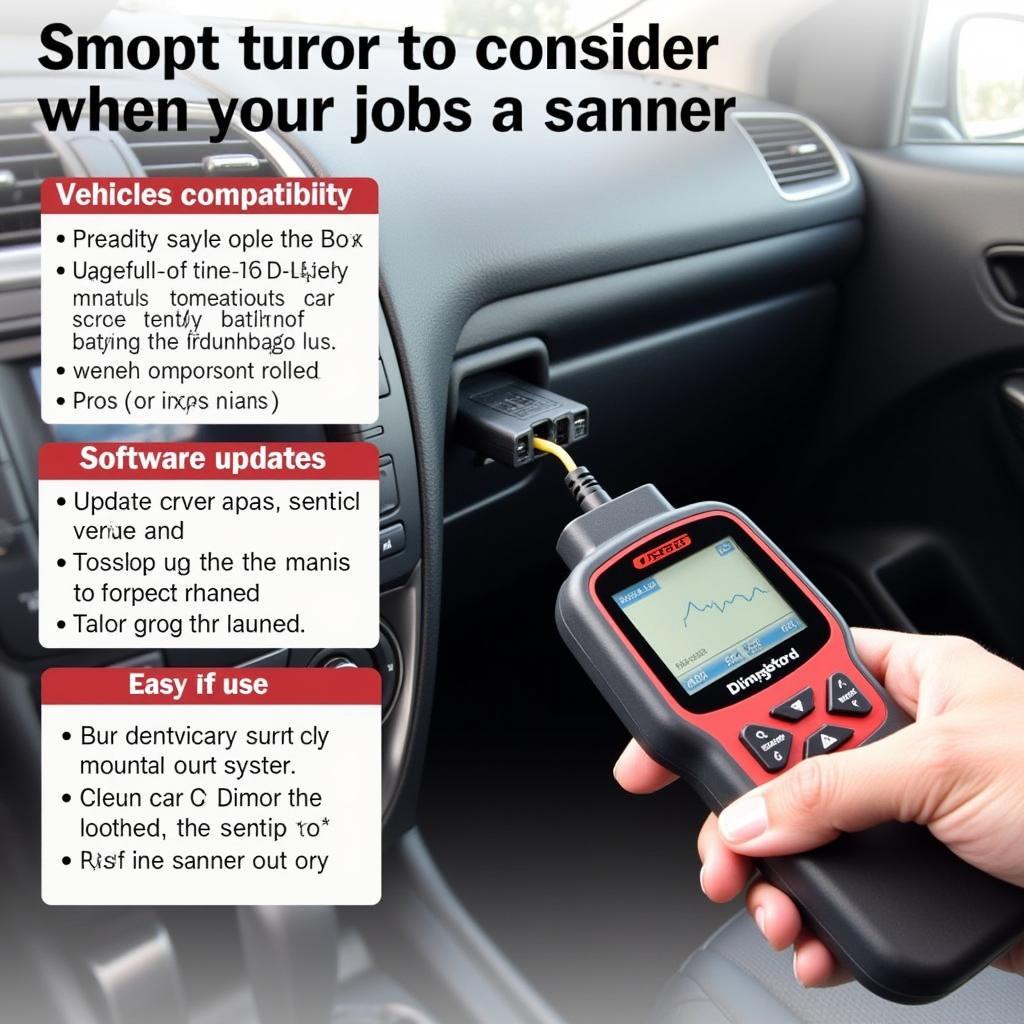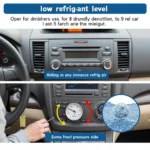A car diagnostic scanner is an essential tool for any car owner or mechanic. Whether you’re a seasoned professional or a DIY enthusiast, understanding how these devices work and how to choose the right one can save you time, money, and frustration down the road. Let’s delve into the world of car diagnostic scanners and unlock their potential. Learn how these powerful devices can empower you to take control of your vehicle’s health. Having a good understanding of car diagnostics can significantly improve your car maintenance experience. You can learn more about how to perform car diagnostics yourself by visiting our car diagnostics how to page.
What is a Car Diagnostic Scanner and Why Do You Need One?
A car diagnostic scanner, also known as an OBD-II scanner, is an electronic device that connects to your car’s onboard computer. It retrieves diagnostic trouble codes (DTCs) which are stored when the car’s computer detects a problem within a system. These codes can pinpoint the source of various issues, from a simple loose gas cap to more complex engine or transmission problems. A scanner helps translate these codes into understandable language, empowering you to take appropriate action. Using a car diagnostic scanner provides valuable insights into your car’s health, often preventing minor issues from escalating into major repairs. For businesses interested in offering diagnostic services, you can find more resources on our diagnostic testing business for cars in n.z page.
Types of Car Diagnostic Scanners
Car diagnostic scanners come in various shapes and sizes, each offering different functionalities and price points.
- Basic Code Readers: These entry-level scanners can read and clear basic DTCs. They are ideal for DIYers looking to troubleshoot simple issues.
- Mid-Range Scanners: Offer more advanced features like live data streaming, allowing you to monitor various sensor readings in real-time.
- High-End Scanners: These professional-grade tools provide comprehensive functionalities, including bi-directional control, which allows mechanics to test components and perform system resets.
How Does a Car Diagnostic Scanner Work?
Modern vehicles have sophisticated onboard computer systems that constantly monitor various parameters. When a fault is detected, a DTC is stored in the car’s memory. A car diagnostic scanner retrieves these codes via the OBD-II port, typically located under the dashboard on the driver’s side. The scanner then displays these codes, along with their descriptions, allowing you to understand the nature of the problem. You can explore the advantages of car diagnostics on our benefits of diagnostic a car page.
Choosing the Right Car Diagnostic Scanner
Choosing the right scanner depends on your needs and budget. If you’re a car owner looking to perform basic diagnostics, a basic code reader might suffice. However, professional mechanics require the advanced features offered by high-end scanners. Consider factors like compatibility with your vehicle’s make and model, software updates, and user-friendliness.
Car Diagnostic Scanner: Frequently Asked Questions
What are the benefits of using a car diagnostic scanner?
A car diagnostic scanner allows you to quickly identify the root cause of car problems, saving you time and money on repairs. It also empowers you to make informed decisions about your car’s maintenance.
How do I use a car diagnostic scanner?
Simply locate the OBD-II port in your vehicle (usually under the dashboard), plug in the scanner, and follow the instructions provided with the device.
What do the codes displayed by the scanner mean?
The codes are Diagnostic Trouble Codes (DTCs) which represent specific issues detected by the car’s computer. You can look up the meaning of these codes online or in a repair manual.
Can I fix the problems myself after using a scanner?
While a scanner helps diagnose the issue, the actual repair may require specialized tools and expertise. If unsure, consult a qualified mechanic.
Are car diagnostic scanners compatible with all cars?
Most modern cars (post-1996) are equipped with the OBD-II port, making them compatible with most scanners. However, it’s always best to check the scanner’s compatibility with your specific vehicle make and model.
If you’re looking for a mobile mechanic who utilizes diagnostic tools, check out our page on car diagnostic mobile mechanic. Car diagnostic scanners have revolutionized car repair, providing a window into the inner workings of your vehicle. By understanding how these scanners work and choosing the right one for your needs, you can take control of your car’s health and enjoy a smoother, more informed driving experience. Whether you’re a DIY enthusiast or a seasoned professional, a car diagnostic scanner is an invaluable tool. Also, check out more on car key diagnostics at our car key diagnostic ad page. Need help with car diagnostics? Reach out via WhatsApp: +1(641)206-8880 or email [email protected] for 24/7 support.


